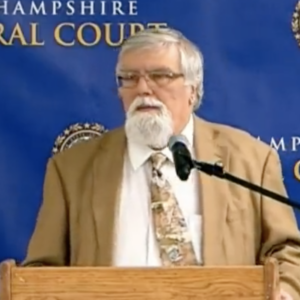Republicans will have the smallest New Hampshire House majority since 1936 for the next biennium. If they can survive all the recounts, that is.
While Executive Council and state Senate majorities held on Tuesday, at 4-1 and 14-10 respectively, Democrats made inroads in the 400-member lower chamber, improving by 10 seats on their 2020 results.
Leaders from both parties proclaimed victory Wednesday, but with more than two dozen recounts ahead, the 203-197 Republican majority is anything but a sure thing.
Even if the number holds, attendance will be key, according to former House Chief of Staff Greg Moore.
“The majority could be decided on a session-by-session basis depending on attendance. Typically, 25-35 members don’t attend most sessions,” Moore said.
Rep. Fred Doucette (R-Salem) echoed those sentiments. “We’re going to have all sorts of attendance problems, and it’s going to be an even bigger problem on committees.” Doucette pointed out committees in a 50-50 House will have to be nearly evenly split between the two parties, and GOP absences would create opportunities for Democratic shenanigans.
The headaches caused by the slim margin number might be seen as early as Organization Day on December 7, when the House elects its Speaker and then both chambers meet together to elect the Secretary of State.
A couple of Republican absences could open a lane to a Democrat Speaker and a challenge for current Secretary of State Dave Scanlan. Scanlan took over when longtime Secretary Bill Gardner retired earlier this year. He has yet to face an election by the legislature.
Budget season, warns Moore, could be even more interesting.
“Both parties will draft up their own state budget and two or three people who get sick will decide which one passes.”
It leaves very little room for error for House Republicans, assuming the razor thin majority survives. And, Moore said, it will give the House some leverage over the Senate.
“The Senate will face challenges if it amends a House bill. Attendance may look very different when the bill goes back over the wall, and there’s no guarantee it’ll pass a second time.”
Doucette said he was open to bipartisan cooperation, but he hasn’t seen much interest from across the aisle. “I’ll be among the first to offer an olive branch. Let’s see if they’ll take it.”
Majority Leader Jason Osborne, R-Auburn, said he wasn’t concerned.
“We have shown that we can be effective with a small majority, and we will do it again,” he said. “[We] can develop a better working relationship” with Democrats, he added.



